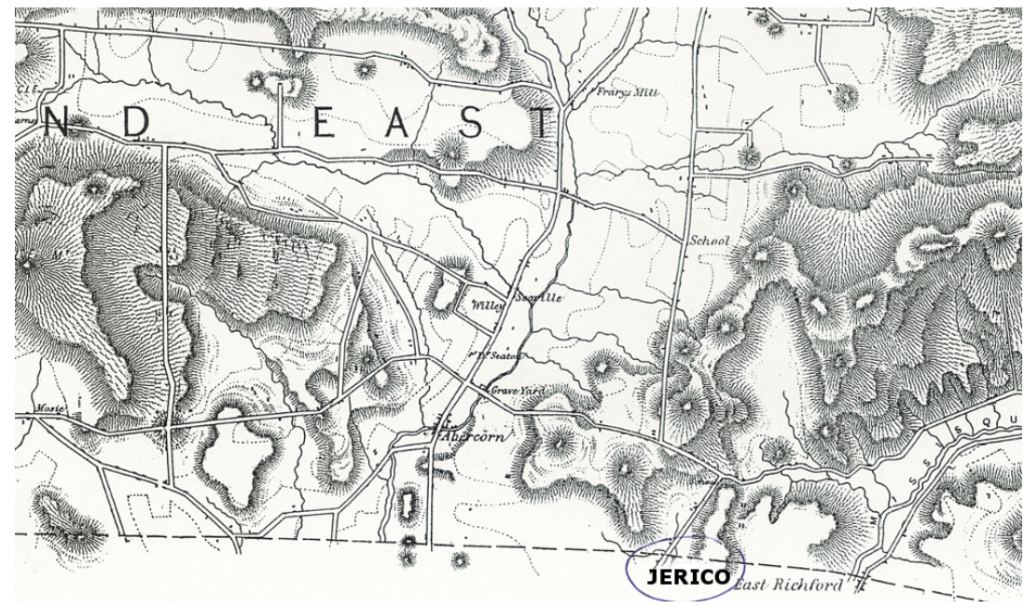A look at one of the lesser known destinations of the Underground Railroad
We all like to think of history, especially more recent history, as something that has been recorded, documented, indexed, and put on a shelf at the local historical society. But sometimes you come across tidbits that point to something more. Like the settlement of escaped slaves known as Jerico in Sutton.
It’s on my route as one of the town garbage truck drivers. Wednesdays are my Glen Sutton run, which puts me in close contact with the US border in several spots. And there, off Scenic and onto Judd Road, you find Jerico Road. It’s a pretty area, with elegant homes separated by acres of forest and rolling hills. The road got its name in 2001, in tribute to the long-vanished settlement that is believed to have existed there.

Image from Hertiage Sutton Historical Society
Practically nothing is known about the settlement or its people. In fact, if it wasn’t a mention of it on a map from 1865, the late local historian Mark Clerk would likely never have even known to look for it. But there it is, spelled Jerico, and not Jericho. The original Jericho is one of the oldest cities in the Middle East, and as the Old Testament says, the Israelite Joshua had his army march around the walled city for six days. On the seventh day they marched around it and, at a precise moment, blew their trumpets and yelled and shouted, and the walls of the city collapsed.
Much raping, pillaging and murdering ensued, but since it was the good guys doing the defiling, it is seen biblically as a good thing. History is written by the victors, I guess.
From this Israelite victory came the hymn Joshua, Fit the Battle of Jericho, an African American spiritual that was popular amongst enslaved Americans in the 1850’s. This was around the time that slaves began trying to escape their bonds and head north, following the series of roads, waterways and safe houses that became known as the Underground Railroad. In all some 30,000 to 40,000 enslaved Americans are believed to have ventured north, most of them to Canada West, today known as Ontario, or to Nova Scotia.
But a few of them came to Canada East. While the existence of a black community in St. Armand is better known, apparently a few came to the border near Richford, Vermont, and then crossed over into Sutton Township.
Beyond that, the information is practically non-existent. His curiosity piqued by the name on the map, Clerk did some digging around and all he could come up with was an article in a Richford newspaper dating from 1980 that referred to Jerico as a black settlement just across the border. Clerk acknowledges that the writer didn’t provide any source material, but he figured they must have had some kind of source for their story.
It’s understandable, I guess. These folks probably weren’t interested in anything other than keeping a low profile. This was an era when escaped slaves were commonly hunted down in the northern US, to be returned to their owners in the south. Slaves were expensive, and rewards for their return generous. And the northern border was little more than a line on a map. And as black slaves were expressly forbidden from learning how to read and write, we don’t have any diaries or letters or documents. Even over in St. Armand, where we know quite a bit more, we don’t really know much about how they lived.
And life in Jerico would have been tough. Cold winters, hilly terrain covered in rocks and virgin forest, not exactly great farming country. Travel was a slow, difficult process. And probably when they did venture south to Richford or north to Sutton Flats (as the village of Sutton was then known), they weren’t treated very well. Racism was a fact of life. If you lived then, you were almost certainly racist.
Clerk said he thought many Jerico residents returned to the US to fight in the Civil War in the 1860’s or returned once the war was over and slavery was abolished. I tend to agree, the natural human tendency being to return to familiar surroundings. Go home, reconnect with family and close friends that had been left behind on the plantations, farms and factories that had previously depended on slave labour.
Back here in Sutton, at a time when tensions between Canada and the US are higher than they have been in many decades, we are left with little to show of long-lost Jerico. No written accounts, no ruins of settler cabins in the hills of Glen Sutton. No graves or markers. Maybe Jerico never existed at all. How much of our history has been lost to the forces of time?
But when I turn off Judd Road onto Jerico every Wednesday morning, it’s nice to think that this remote corner of Sutton was once a place where a few folks experienced freedom for the first time.
